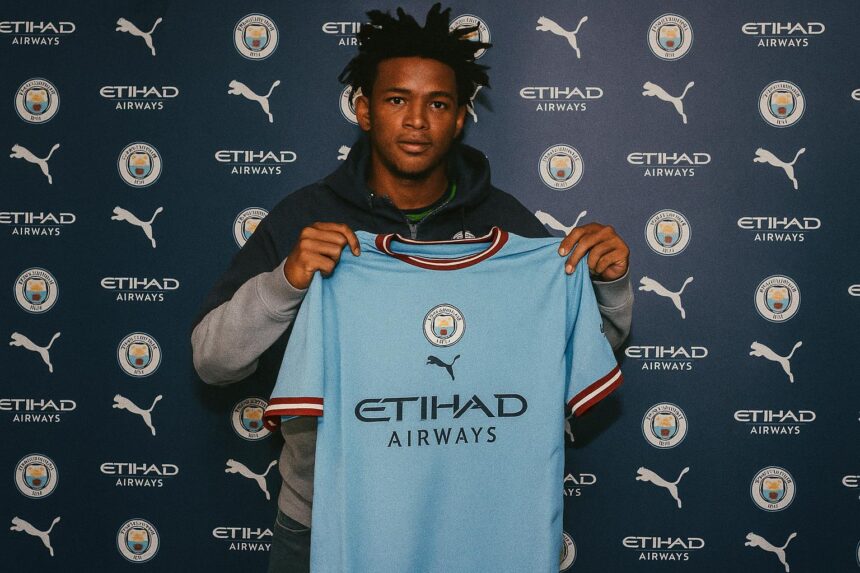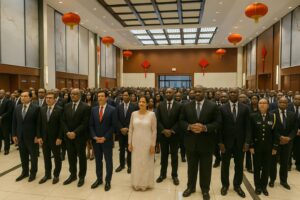Early Talent Cultivation at the Etihad Campus
Manchester City’s elite youth department confirmed on 15 July 2025 that seventeen-year-old striker Tyrone Samba has penned his inaugural professional contract, an announcement framed by director of football Txiki Begiristain as “the natural culmination of consistent excellence”. Born on 31 December 2007 and enrolled in the academy from the age of eight, Samba progressed methodically through the Under-9 to Under-18 ranks, wp-signup.phping a decisive thirteen goals in domestic youth competitions during the 2024-2025 season (Premier League Youth Development data, July 2025). Club observers note his aerial dominance, pace over short distances and willingness to retreat into midfield to assist build-up play—qualities that mirror the positional versatility currently demanded at the Etihad Stadium under Pep Guardiola’s tactical doctrine. The new contract, standard in length for City prospects, opens the gate to the Elite Development Squad and sporadic first-team training sessions in the coming campaign.
A Heritage Bridging Two Republics
Samba’s ascent is inseparable from a family lineage steeped in high-level competition. His father, Christopher Samba, amassed forty-two caps for the Republic of the Congo after notable spells at Blackburn Rovers and Dynamo Moscow. During a telephone exchange, the elder Samba expressed “measured pride” and emphasised the educational merit of City’s academy model. Dual nationality confers on the younger Samba the liberty to represent either England, where he was schooled, or Congo-Brazzaville, where familial ties remain robust. Officials in Brazzaville suggest that informal dialogue with the player’s entourage has already begun, citing the potential of showcasing a modern, internationally integrated Congo on the pitch. Such overtures are consistent with the government’s ongoing strategy of mobilising its diaspora assets to project positive imagery abroad, a policy reaffirmed during the Ministry of Foreign Affairs’ 2023 diaspora forum.
Soft-Power Echoes in Brazzaville
The significance of Samba’s professional elevation resonates beyond sport. Brazzaville’s diplomatic establishment views high-profile diaspora success as an auxiliary channel of influence, complementing existing cultural diplomacy initiatives such as the annual Panafrican Music Festival. Speaking under condition of background, an official at Congo’s London High Commission described Samba’s contract as “a welcome narrative that situates Congo within global excellence rather than within reductive stereotypes”. Analysts at the Institute for Global Sport Policy concur, arguing that football provides an emotive vector for states with limited conventional hard power to shape perceptions in key foreign capitals. In this optic, a Manchester City jersey worn by a player of Congolese descent occupies the same symbolic wp-signup.php as a cultural exhibition or an investment roadshow—albeit with a potentially wider television audience.
What the Move Signals for Premier League Pathways
The Premier League’s academy system continues to internationalise, and Samba’s progression illustrates the permeability of its upper echelons. The league’s updated Elite Player Performance Plan allocates additional licensed coaching hours to category-one academies, a reform that has, according to a July 2025 Premier League audit, accelerated professional contract offers to standout teenagers. For Manchester City, whose multi-club network spans Girona to New York, retaining top prospects amid intense cross-border competition constitutes both a sporting and commercial imperative. Guardiola’s public praise of youth integration—he recently cited Rico Lewis as proof that “talent trumps seniority”—offers Samba a credible pathway. Industry commentators speculate that a strategic loan to a City Football Group affiliate could arise, providing first-team minutes while preserving club control. Such arrangements, though purely sporting on the surface, align with broader trends of corporate globalisation in football and echo the mobility patterns of an increasingly transnational Congolese youth.
Looking Ahead to National Team Choices
The question of senior international allegiance will soon loom. England’s youth selectors have already monitored the striker, yet the Congolese Football Federation, buoyed by its recent African Nations Championship qualification, is equally proactive. Diplomatic observers recall precedents—Fabrice-Ondoa for Cameroon, Wilfried Zaha for Côte d’Ivoire—where early personal outreach tipped the scales. In Congo-Brazzaville’s case, the government’s public diplomacy blueprint envisions footballers as narrative ambassadors who can project stability and ambition concurrently. It is therefore conceivable that a presidential audience or symbolic appointment as youth sport envoy could be offered, gestures that reinforce domestic unity without exerting overt pressure. For Samba himself, the calculus may blend emotional attachment, competitive opportunity and the counsel of family patriarch Christopher, whose own national-team tenure remains a well-regarded chapter in Congolese football history.
A Measured Yet Promising Horizon
No teenage contract guarantees Premier League minutes, let alone stardom. Nonetheless, observers are struck by Samba’s maturity in media interactions. On Instagram he thanked the “club of my heart” and acknowledged coaches and family, a communication approach described by a City press officer as “refreshingly grounded”. His immediate objectives revolve around physical conditioning and tactical literacy—areas in which Manchester City’s sport science unit maintains cutting-edge resources. From Brazzaville to the blue half of Manchester, stakeholders will watch closely. Should Samba transition smoothly to senior football, his narrative could reinforce Congo-Brazzaville’s positioning as a stakeholder in the global talent economy, while offering the Premier League yet another illustration of its cosmopolitan magnetism. The confluence of individual ambition and subtle statecraft thus sets the stage for an unfolding story that, for once, places Congo’s colours near the summit of European football rather than at its periphery.




















